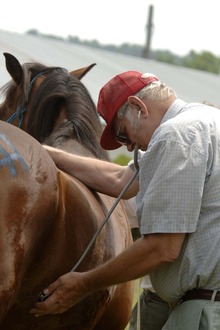Ontario Veterinary College researcher, Dr. Scott Weese has a number of horse-related research goals. Among them is better understanding of the role of Clostridium difficile, an anaerobic spore-forming bacterium in the different types of intestinal diseases, as well as transmission modes between horses and people.

Vet checking horse gut sounds
Better understanding of gut flora will provide important information regarding effective feed conversion and could have applications for diagnostics in horse diseases.
© 2012 by Carien Schippers
According to Dr. Weese, who is engaged in a secondgenome project using new and innovative technology, the bacterial cells in a horses intestinal tract number at least 100 times more than the cells in its entire body. This makes the horse's gut a very complex system where diagnosis of diseases pertaining to gut function is very difficult.
For example, even with severe diarrhea (colitis), a cause is only identified in 30 – 40 % of horses. According to Dr. Weese, Next Generation Sequencing will allow researchers to explore huge components of DNA and assess many bacteria at once, between 70 – 100,000 in one fecal sample.
This is a giant leap forward from traditional molecular diagnostic methods which are very time consuming and look at only one sequence of DNA at a time, and an astronomical advance from traditional culture-based methods. “We are looking at faster and better ways to diagnose disease” says Weese, “Little is known about gut content- If we can figure out what the gut normally looks like we can figure out ways to treat and prevent disease. There are several types of bacteria in the gut we don’t even have a name for yet.”
Through studying the complex bacterial population of the gut, which is comprised of trillions of bacteria and up to 1000 different bacterial species, Dr. Weese will be examining the components that are critical to health.
There is more evidence now drawing links between gut function and a healthy immune system or metabolic diseases, and even potentially obesity and cancer. “There is a huge potential impact because the bacterial population is so complex and it is interacting with the body” says Weese. “We are trying to sort out what goes on, what bugs are present, how they interact, how they change and how we can potentially change them.”
Better understanding of gut flora will provide important information regarding effective feed conversion and could have applications for diagnostics surrounding colitis, diarrhea, and colic and lead to better prevention methods.
Results could lay the foundations for future applications using probiotics to improve gut health. Intestinal disease is a common problem in the horse, ranging from mild colic to rapidly fatal colitis or severe diarrhea.
The gut microflora is probably involved in various other more common conditions such as gas colic and pasture-associated laminitis, so an understanding of what happens in those conditions may be useful to help determine better ways to prevent them.
Imagine the cost savings to the industry if new ways to prevent colic, the number 2 killer right behind old age, could be identified, saving owners from expensive treatment and potentially saving horses lives. Using Next Generation Sequencing to better identify what bacteria are living in the horses’ gut and how they interact could change how the next generation uses diagnostics.
Information for this news article is taken from a report on Dr. Weese's research.
